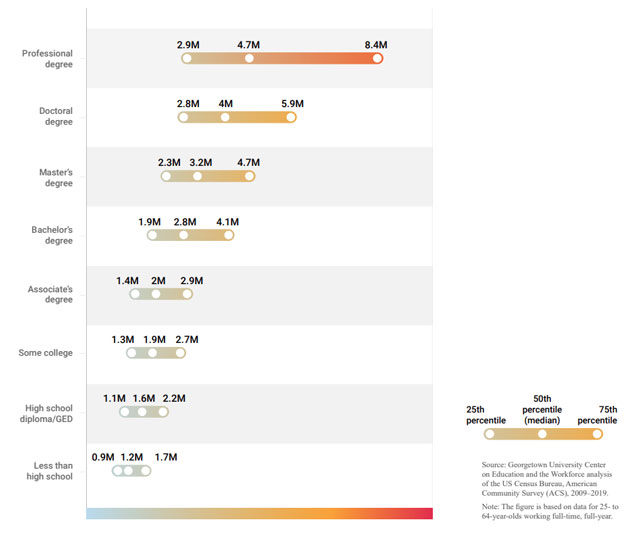Report: Degree Holders Don't Necessarily Earn Higher Incomes
- By Dian Schaffhauser
- 10/12/21

As the Georgetown University Center on Education and the Workforce found, substantial differences in lifetime earnings within education levels mean that some workers with less education earn more than others with more education. Source: Georgetown University CEW.
People who complete a higher level of education don't always earn more than those who lack a four-year degree. That's the big news out of the Georgetown University Center on Education and the Workforce (CEW), which found in a new study that 16 percent of high school graduates, 23 percent of workers with some college education and 28 percent of associate's degree holders earn more over a lifetime than half of workers with a bachelor's degree. As the study's authors put it, "The simple advice to high school students to 'go to college' no longer suffices."
That said, overall, more education is likely to dramatically boost lifetime earnings. The lifetime earnings of full-time, full-year workers with no diploma amount to a median of $1.2 million, while those with a high school diploma earn a median of $1.6 million. The report compared that to:
- Associate degree holders who earn a median of $2 million;
- Bachelor's degree holders who earn a median of $2.8 million;
- Master's degree holders who earn a median of $3.2 million;
- Doctoral degree holders who earn $4 million; and
- Professional degree holders who earn $4.7 million.
Median earnings refer to the number that falls in the middle when ranking reported lifetime earnings in a given category from high to low. The research used data from the U.S. Census Bureau's American Community Survey to construct lifetime earnings, limited to people aged 25-64 working full-time and full-year for whom there were earnings data. The researchers built "synthetic age-earnings profile" for each category by education level — gender, race, undergraduate major, occupation, industry and state.
According to the report, specific variations in earnings are linked to field of study, occupation, geography and other factors. For example, people with a bachelor's degree in architecture and engineering have median lifetime earnings of $3.8 million, which is well above the median of $3.2 million for all master's degree holders. Likewise, an associate degree holder in a computer and mathematical occupation has the same median lifetime earnings overall as a bachelor's degree holder. Those workers with a high school diploma earn the most in Wyoming, Alaska and North Dakota, while those with a bachelor's degree earn the most in the District of Columbia and Connecticut.
Gender, race and ethnicity also continue to play an overriding role in lifetime earnings:
- Women with associate degrees earn a median of $1.8 over their lifetimes, while men earn $2.3 million. And women with bachelor's degrees earn $2.4 million, compared to $3.3 million for men.
- White workers have the highest median lifetime earnings across all races and ethnicities at lower levels of education. White workers earn a median of $2.1 million, compared to $2 million for Asian workers, $1.9 million for Latinx workers and $1.7 million for Black workers. At the bachelor's degree level, White workers earn a median of $2.9 million, versus $2.3 million for Black and Latinx workers and $2.9 million for Asian workers.
- At the master's degree level, Asian workers have the higher earnings, $4 million, compared to $3.2 million for White workers, $3 million for Latinx workers and $2.7 million for Black workers.
The study reported that the highest-paying occupations across all education levels were, in order: computer and mathematical, health practice, and architecture and engineering.
"Students need professional guidance on the economic outcomes of college and career pathways before they make one of the biggest decisions of their lives," said Ban Cheah, report author and CEW research professor and senior economist, in a statement.
To that end, Cheah and his fellow researchers, Anthony Carnevale and Emma Wenzinger, recommended expanding and improving career counseling systems. "Ideally, career counselors would help students navigate the relationship between education and labor market outcomes," the report advised. "A comprehensive career counseling system would empower students by giving them the information and support they need to make informed decisions about their education and occupation that ultimately influence their lifelong earnings and well-being."
The full report, "The College Payoff: More Education Doesn't Always Mean More Earning," as well as data visualizations are available on the Georgetown University CEW website.
About the Author
Dian Schaffhauser is a former senior contributing editor for 1105 Media's education publications THE Journal, Campus Technology and Spaces4Learning.